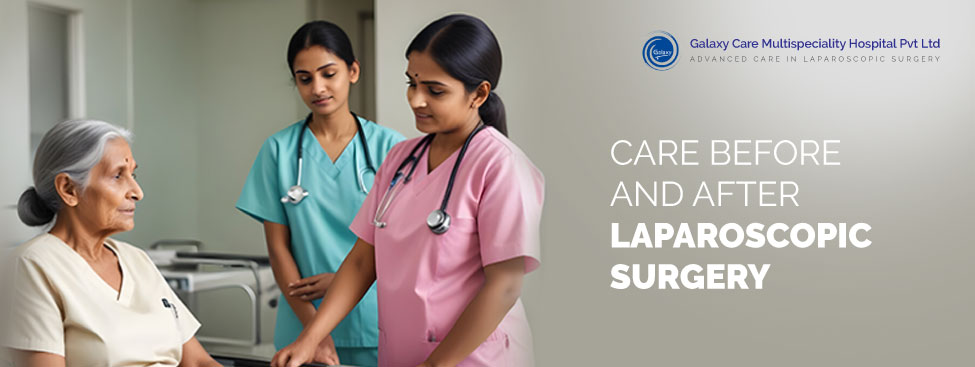
Pre-Operative and Post-Operative Care For Laparoscopic Surgery
Laparoscopic surgery, also known as minimally invasive surgery, is a modern surgical technique that has revolutionized the way many medical procedures are performed. Unlike traditional open surgery, laparoscopic surgery involves making small incisions in the body, through which a tiny camera and surgical instruments are inserted. This approach allows for a faster recovery time, reduced pain and scarring, and a lower risk of complications.
As the Best Laparoscopic Cancer Surgery Hospital in Pune, we have performed thousands of laparoscopic surgeries over the years. In this blog, we will explore the pre-operative and post-operative care required for patients undergoing laparoscopic surgery, with a focus on the best practices and considerations to ensure a successful outcome. Let’s begin.
Pre-Operative Care for Laparoscopic Surgery
Comprehensive Medical Evaluation
Before undergoing laparoscopic surgery, patients will undergo a comprehensive medical evaluation. This typically includes a physical examination, laboratory tests, and imaging studies to assess the patient’s overall health and identify any underlying conditions that may affect the surgical procedure or recovery.
Patient Education and Counseling
Patients will receive detailed information about the laparoscopic surgical procedure, including the expected outcomes, risks, and potential complications. The surgeon will also discuss the patient’s medical history, lifestyle, and any concerns they may have, ensuring that the patient is fully informed and prepared for the surgery.
Medication Management
Patients may be required to adjust or discontinue certain medications before the surgery, such as blood thinners or anti-inflammatory drugs, to reduce the risk of bleeding or other complications. The surgeon will provide specific instructions regarding medication management.
Dietary and Lifestyle Adjustments
Patients may be asked to make dietary and lifestyle changes in the days or weeks leading up to the surgery, such as quitting smoking, avoiding certain foods, or engaging in light exercise. These adjustments can help optimize the patient’s overall health and facilitate a smoother recovery.
Post-Operative Care for Laparoscopic Surgery
Pain Management
After the laparoscopic surgery, patients may experience some discomfort or pain. The healthcare team will work closely with the patient to manage their pain effectively, using a combination of pain medications, ice packs, and other comfort measures.
Wound Care
The small incisions made during laparoscopic surgery typically heal quickly, but proper wound care is essential to prevent infection and promote healing. Patients will receive instructions on how to care for the incisions, including when to change dressings and how to identify any signs of complications.
Mobility and Activity Levels
Patients are encouraged to start moving and engaging in light activity as soon as possible after the surgery, as this can help prevent complications such as blood clots and improve overall recovery. The healthcare team will provide specific guidance on appropriate activity levels and exercise recommendations.
Dietary Considerations
Patients may be required to follow a specific dietary plan during the recovery phase, which may include a gradual progression from clear liquids to solid foods as the digestive system recovers from the surgical procedure.
Follow-up Care
Patients will have regular follow-up appointments with their healthcare team to monitor their progress, address any concerns, and ensure a successful recovery. These appointments may include physical examinations, diagnostic tests, and discussions about long-term care and lifestyle adjustments.
Conclusion
Laparoscopic surgery is a highly effective and minimally invasive approach to many medical procedures, including cancer treatment and gynaecological surgeries. Laparoscopic gynae surgery has been at the forefront of this innovative technique, providing patients with a safer and more comfortable surgical experience. By understanding the importance of pre-operative and post-operative care, patients can maximize the benefits of laparoscopic surgery and achieve a smooth and successful recovery.
Consult Dr Shailesh Puntambekar at Galaxy Care Hospital, Pune
Dr. Shailesh Puntambekar is widely recognized as the pioneer of Laparoscopic Surgery in India. As the Medical Director of Galaxy Care Hospital, he has been at the forefront of developing and refining minimally invasive surgical techniques, particularly in the areas of Laparoscopic cancer surgery and Laparoscopic gynae surgery.Dr. Puntambekar’s expertise and innovative approach have earned him numerous accolades, including the prestigious “Golden Telescope Award” from the American Association of Gynecological Laparoscopy (AAGL) for best video presentations. He is also the first robotic oncosurgeon in India, having performed over 400+ robotic surgeries. Through his tireless efforts, Dr. Puntambekar has played a pivotal role in advancing the field of laparoscopic surgery and providing patients in Pune and beyond with access to world-class, minimally invasive surgical care. Feel free to get in touch with us to book an appointment and get the best laparoscopic surgery experience.


